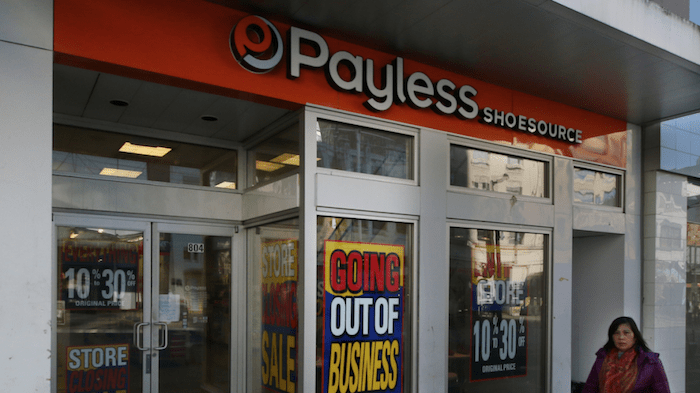 Sign of the times: Payless ShoeSource closed its Â鶹´«Ă˝Ół»outlet this year | Photo: Chung Chow
Sign of the times: Payless ShoeSource closed its Â鶹´«Ă˝Ół»outlet this year | Photo: Chung Chow
Development pressure has driven Â鶹´«Ă˝Ół»retail rents sky high and convinced some landlords to include demolition clauses so they can boot retailers out if a developer wants in.
“Many small business owners [in Vancouver] can no longer afford the regions they have long operated in due to a doubling and sometimes even tripling in their annual property taxes,” according to commercial real agency Cushman & Wakefield in its latest report on Metro Vancouver’s retail real estate.
The increasing street front vacancies on Robson Street is a result of this trend as even tenants with the ability to afford premium rents are not willing to pay for a build-out with the uncertainty of a possible eviction, the report noted.
BC Assessment values a commercial property at its highest and best use, not its current configuration. This led to the closure of Dupont Paint, 3 Vets and Craftsman Collision, all long-time retailers in the Broadway corridor, as well as a rash of store closures downtown.
This year has also seen the shuttering of chain outlets in Vancouver, including Payless ShoeSource and Home Outfitters, though these were linked to corporate decisions that affected locations across the country.
Vancouver’s downtown retail vacancy rate is now 5.6%, the highest in the region, according to Cushman & Wakefield.
Annual retail lease rates on Robson Street range from $120 per square foot to $225 per square foot and are even higher on Alberni Street, at a maximum of $250 per square foot, which can prove a further barrier to smaller retailers.
“Some landlords don’t want to lower [retail] rents because it reduces the value of their building,” said Craig Patterson, editor of Retail Insider. “They would rather leave [storefronts] empty.”
Some owners are taking protective measures.
“Many landlords are including demolition clauses in lease agreements to maintain flexibility with redevelopment timelines,” Cushman & Wakefield stated. “This is becoming prevalent in areas such as Robson Street and the Broadway Corridor in the older low-rise buildings.”
But Cushman & Wakefield cautions that downtown landlords may have to “rethink” to remain competitive as large new retail projects, such as the Post development on West Georgia and the remake of the Bentall Centre Mall, prepare to disrupt the downtown shopping scene.


